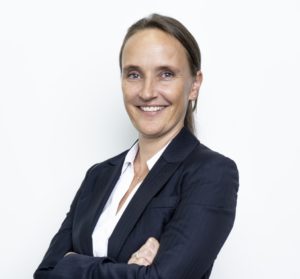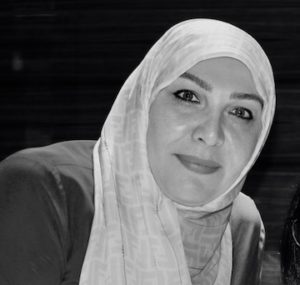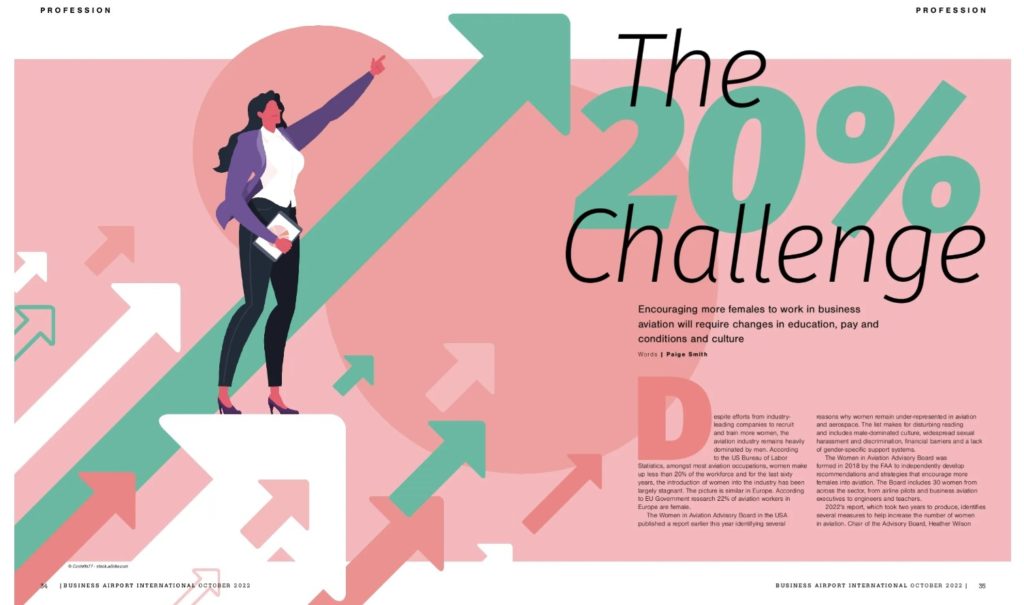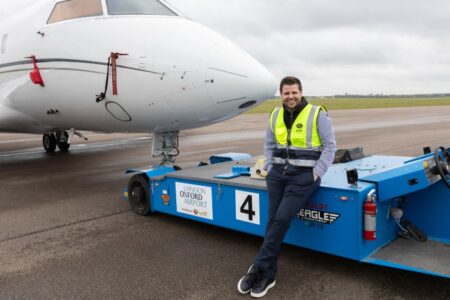Despite efforts from industry-leading companies to recruit and train more women, the aviation industry remains heavily dominated by men. According to the US Bureau of Labor Statistics, amongst most aviation occupations, women make up less than 20% of the workforce and for the last sixty years, the introduction of women into the industry has been largely stagnant. The picture is similar in Europe. According to EU Government research 22% of aviation workers in Europe are female.
The Women in Aviation Advisory Board in the USA published a report earlier this year identifying several reasons why women remain under-represented in aviation and aerospace. The list makes for disturbing reading and includes male-dominated culture, widespread sexual harassment and discrimination, financial barriers and a lack of gender-specific support systems.
The Women in Aviation Advisory Board was formed in 2018 by the FAA to independently develop recommendations and strategies that encourage more females into aviation. The Board includes 30 women from across the sector, from airline pilots and business aviation executives to engineers and teachers.
2022’s report, which took two years to produce, identifies several measures to help increase the number of women in aviation. Chair of the Advisory Board, Heather Wilson says, “The biggest barrier that discourages women from entering and staying in aviation careers is culture – and it is the hardest to change.
“Women don’t feel like they belong. Changing culture requires consistent leadership commitment over time and thousands of large and small actions across government and industry. It’s hard work. It’s time to get started.”
Education and awarness
There has been progress developing women in business aviation, but anecdotally there is clear evidence
under-representation exists in the sector.
“From the time that I started in business aviation, I can confidently say that I have noticed a change and there is more inclusivity and acceptance towards women in aviation,” says Alexandria Colindres, CEO at the Registry of Aruba, a global one-stop aircraft registry for the business aviation sector. “However, I think the aviation industry still has a long way to go in encouraging women into the sector.

“It is certainly a male-dominated industry, but that doesn’t mean it’s not worth encouraging women into this field. The more women in aviation, the more opportunities we will have to grow and create additional jobs,” she says.
Colindres believes a focus on education is required to encourage women into business aviation.
“Organizations must reach out to future generations of workers by collaborating with academic institutions to raise awareness of the field and the opportunities it has to offer,” she says.
Tatiana Uzel, the owner of private jet operator Open Aero believes education programs are needed to raise awareness of the sector amongst young women. “Business aviation is such a niche sector. I have no idea how young people find out about the existence of this industry at all! I came across it entirely by chance,” she says. “There are very few academic programs relevant to business aviation, which is crazy for an industry that has existed for such a long time. The ones do exist cost an astronomical amount of money.”
Sarah Keates, founder of WOI, a PR agency for business aviation brands, helped to develop and launch the AsBAA Discovery education initiative, along with a number of CSR programs promoting gender equality and education. She says education initiatives about aviation need to be specifically targeted at females. “Girls don’t consider a career in aviation because they perceive that there are limited opportunities,” she says. “We need to ensure they know the industry has a breadth of opportunities.”
Mervat Sultan, co-founder and president of Women In Aviation Middle East agrees that one of the main reasons holding women back from aviation is the lack of awareness. “They simply are not familiar with the number of opportunities the industry has to offer,” she says. “We need the help of companies in the industry to change the perceptions about what jobs are available for women.”
Companies could offer paid internship programs that target female students for different roles including engineering, maintenance, planning and operations, Sultan suggests.
“Educating and showcasing the opportunities available to women in the aviation industry should be a priority for industry leaders,” says Sultan. “Not only will this be beneficial to women seeking a career path, but it will also be beneficial to companies, which will be able to hire from a larger pool of potential employees.
“We also need to work together to change the industry’s image. More women could enter the field if it is made more welcoming. There are women who have achieved success in aviation, but they are seldom talked about. Our industry can overcome this through social media campaigns, advertising, and marketing,” she adds.
Role models

Having a mentor is vitally important for women starting a career in business aviation, but it’s not always easy with so few women in more senior roles. “Role models should continue to show girls clear routes into business aviation. When we see others achieve success, our own path is more accessible,” says Keates. “Mentorship, guidance, and education should be the cornerstone of any new career.”
Colindres also advocates the need for support networks. She says, “I truly believe that it is essential for women to support each other in business aviation. I am fortunate to have a strong group of female supporters that have guided me along my career. I’ve had many mentors along the way.”
Maternity needs
Another common factor identified as a large barrier to careers in aviation was the difficulty of balancing motherhood with work.
“Employers need to be more flexible when it comes to working mothers,” says Colindres. “A toll is often placed on working mothers who are juggling household duties, childcare and their full-time job.
“This is even more prevalent in business aviation as many women are often reluctant to disclose the fact that they are mothers, due to the demands that business aviation can place on an employee, such as unorthodox working hours and travel requirements,” she adds.

Uzel agrees that the sector needs to accommodate maternity leave better. “Women shouldn’t have to face the choice between a successful career and economic independence or giving their baby the best start in life,” she says. “Industries that acknowledge and provide solutions for maternity will automatically attract more talented women.
Caroline Cresp, chief commercial officer at Jet Luxe believes societal factors also need to be accounted for. “I personally took time for my kids and family and wouldn’t want to change that for anything. Although I took that time out, I was happy to return to the sector into a senior role. For more women to be able to do this, we need to prioritize fair and equal pay and conditions that suit families,” she says.
Money matters
The business aviation industry has also been slow to provide equal pay and treatment for women. The consensus amongst interviewees for this article is that sadly gender equality is not yet a reality. Colindres believes there is no easy answer to overcoming problems such as “low salaries, the hours those salaries fund, and a lack of flexibility for time with the family,” she says. “But if we want to move forward as an industry, we must address these issues.”
Sultan says, “There is no doubt the sector has a gender pay gap. However, there is more to gender inequality than just pay. When it comes to promotions, training, and mentoring, women are often not given the same opportunities as men.
“Women have made strides to combat these issues recently, but there is still much to be done. As a result, industry players have started offering scholarships to young women to encourage them to pursue careers in this field.”
“It’s not a secret that women are still paid less than men in most sectors. That said, I have seen a change in the UAE over the past years. Women are filling more high-level positions and getting paid similar salaries,” says Cresp.

Perhaps one of the most shocking revelations discovered from talking to these industry insiders was the experience of sexism that some of the women have come up against.
“As far as I can see there is still a lot of sexism,” says Keates. “Women in this industry have a great sense of solidarity. We all understand the challenges we face. When I’m faced with challenges, I ask for advice from women I trust and respect. When in doubt, I revert to my personal and professional values.”
“I have faced my share of sexism – from being ignored or not acknowledged during business meetings, to being objectified sexually during industry engagements,” says Colindres.
“I learned early on that to gain respect from my colleagues I must strive to be the smartest in the room, so I am always working hard and learning as much as I can.”
A career worth pursuing
Despite the challenges women in the industry are facing, all agree that it is worth pursuing a career in business aviation. “Although it’s a niche market, the variety of opportunities is vast. Have a good look around and you’ll surely find something you enjoy,” says Cresp.
“Business aviation is growing at a rapid rate and there are numerous opportunities for women interested in pursuing a career in the field,” says Colindres.
“I love business aviation with all my heart, and I believe this is a wonderful and highly rewarding industry with extraordinary people working in it,” says Uzel. “But it takes a very passionate and stubborn character to stick around. This is not a type of work you can handle if your only motivation is getting paid at the end of the month.”

Regardless of some of the trials women are still facing, there is a strong belief that women working in aviation have a lot of potential to realize. “The future is wide open,” says Sultan. “Women have increasingly been entering this sector over the past few years and there has been several impressive female-founded companies founded over the past decade. There are more women pilots and entrepreneurs in the industry than ever before.”
Colindres agrees, “I truly believe that the future for women in aviation is bright, again it is all about leveraging your strengths and remembering that the workforce is only amplified by placing women in positions of power.”
“Change might be slow, but it’s happening and as it does, more women will be motivated to pursue careers in business aviation,” says Keates.





